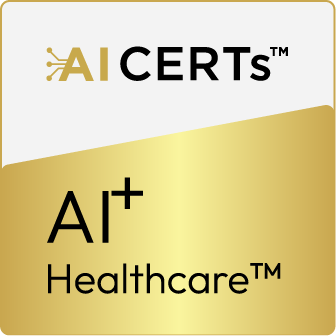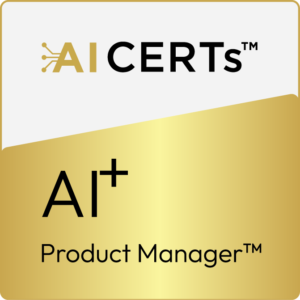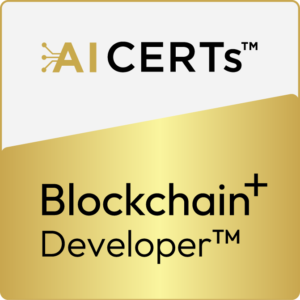Description
AI+ Healthcare (1 Day)
Program Detailed Curriculum
Executive Summary
The AI+ Healthcare certification program offers a comprehensive exploration of technologies like machine
learning, deep learning, and neural networks within the healthcare domain. These tools are utilized to
enhance diverse areas including medical imaging, diagnostics, treatment planning, patient monitoring,
and healthcare administration. AI enhances diagnostic accuracy, tailors treatment strategies, and
facilitates streamlined resource allocation. Nonetheless, integrating AI into healthcare poses challenges
concerning data integrity, privacy, ethical concerns, and regulatory adherence. As AI continues to advance,
it holds the potential for significant progress in patient care, predictive analytics, and operational efficacy
within the healthcare industry.
Course Prerequisites
Basic understanding of healthcare world, no technical expertise or knowledge required.
Readiness to think innovatively, generating novel ideas, and effectively utilizing AI tools in healthcare
Openness to exploring various aspects of AI in healthcare, including its implications, challenges, and opportunities.
Strong interest and motivation to delve into the integration of AI technologies within the healthcare sector.
Module 1
Introduction to Artificial Intelligence (AI) in Healthcare
1.1 Fundamentals of Artificial Intelligence
Definition and History of AI: Delve into AI’s roots and evolution, tracing its journey from conception to current
applications, exploring its impact on society and technology.
Key Technologies: Unpack the core pillars of AI—Machine Learning, Deep Learning, and Neural Networks—
understanding their workings, applications, and transformative potential.
Overview of AI Applications in Various Industries: Survey the expansive landscape of AI applications across
industries, analyzing its role in revolutionizing healthcare, finance, transportation, and beyond.
1.2 AI in the Healthcare Ecosystem
Understanding Healthcare Data Types: Explore the nuances of healthcare data, encompassing electronic health
records, medical images, and genomic information, vital for AI-driven healthcare innovation.
Role of AI in Healthcare: Assess AI’s transformative potential in healthcare, from improving diagnostics and
treatment to addressing privacy concerns and regulatory challenges.
Overview of Healthcare Industry Stakeholders: Examine the roles of healthcare providers, payers, and
pharmaceutical companies, understanding their interactions and impact on healthcare delivery and innovation.
1.3 Ethical and Regulatory Framework
Privacy and Security in Healthcare AI: Navigate the complexities of safeguarding patient data in AI applications,
addressing privacy concerns, and implementing robust security measures.
Ethical Considerations: Bias, Fairness, and Transparency: Examine ethical dilemmas in AI, focusing on bias
mitigation, fairness enhancement, and transparency promotion in healthcare algorithms and systems.
Regulatory Landscape for AI in Healthcare: Decode regulatory frameworks governing AI in healthcare, including
FDA guidelines, HIPAA regulations, and GDPR compliance, ensuring ethical and legal AI deployment.
Module 2
Data Handling and AI Modeling
2.1 Data Acquisition and Management
Data Collection Techniques in Healthcare: Explore methods for gathering healthcare data ethically and efficiently,
covering sources such as electronic health records, wearables, and IoT devices.
Data Storage and Management Solutions: Delve into storage and management systems tailored for healthcare
data, addressing scalability, security, and interoperability to ensure accessibility and compliance.
Ensuring Data Quality and Integrity: Learn strategies to maintain high-quality healthcare data, emphasizing
accuracy, consistency, and security measures to uphold integrity for effective analysis and decision-making.
2.2 Preprocessing Techniques for Medical Data
Handling Missing Data and Anomalies: Develop skills to identify, handle, and mitigate missing data and anomalies
in datasets, ensuring data completeness and integrity for analysis.
Data Normalization and Standardization: Learn techniques to transform data into a uniform format, enhancing
model performance and interpretability through normalization and standardization methods.
Feature Engineering and Selection: Master the art of crafting informative features and selecting relevant ones,
optimizing model performance and interpretability for efficient machine learning algorithms.
2.3 Model Development and Validation
Designing AI Models for Healthcare: Tailor AI models to healthcare needs, integrating domain knowledge and
ethical considerations for effective diagnosis, treatment, and patient care.
Training and Tuning Models: Overfitting and Underfitting: Balance model complexity to mitigate overfitting or
underfitting, optimizing performance through proper training and tuning techniques.
Model Evaluation Metrics and Validation Techniques: Assess model performance using diverse metrics and
validation methods, ensuring reliability, generalizability, and ethical deployment in healthcare applications.
Module 3
AI in Medical Imaging
3.1 Introduction to Medical Imaging
Types of Medical Imaging: Explore diverse medical imaging modalities, understanding principles, applications, and
differences between X-ray, MRI, and CT scans in healthcare diagnostics.
Challenges in Medical Imaging Data Handling: Navigate complexities in managing large-scale medical imaging
datasets, addressing issues of data quality, privacy, and interoperability for effective analysis.
Image Data Augmentation Techniques: Enhance medical image datasets through augmentation methods like
rotation, flipping, and noise addition, improving model robustness and performance in healthcare applications.
3.2 AI Techniques in Imaging
Deep Learning Models for Image Analysis (CNNs, GANs): Master Convolutional Neural Networks (CNNs) and
Generative Adversarial Networks (GANs) for image analysis, unlocking their potential in healthcare diagnostics.
Case Studies: Enhancing Image Quality and Diagnosis Accuracy: Explore real-world applications of image
enhancement techniques and diagnostic accuracy improvement using advanced imaging technologies.
Innovations in Image Segmentation and Object Recognition: Investigate cutting-edge techniques in image
segmentation and object recognition, revolutionizing medical image analysis for precise diagnosis and treatment
planning.
3.3 Implementation and Future Trends
Integration of AI Tools into Clinical Workflows: Seamlessly integrate AI tools into clinical practices, optimizing
workflows for enhanced efficiency, accuracy, and patient care across various medical specialties.
Future of AI in Radiology and Pathology: Forecast the evolving role of AI in radiology and pathology, envisioning its
transformative impact on diagnosis, treatment planning, and patient outcomes.
Emerging Technologies and Their Potential Impact: Explore the latest technological advancements and their
potential to revolutionize healthcare, from personalized medicine to remote patient monitoring, shaping the future
of healthcare delivery.
Module 4
AI in Diagnostics and Predictive Analytics
4.1 AI-powered Diagnostic Systems
AI in Disease Identification and Diagnosis: Harness AI algorithms to aid in disease identification and diagnosis,
improving accuracy, efficiency, and early detection across various medical specialties.
Real-Time Analysis and Decision Support Systems: Develop real-time AI systems for rapid analysis and decision-
making, facilitating timely interventions and personalized treatment plans in clinical settings.
Case Studies: AI in Oncology, Cardiology: Examine AI’s transformative impact on oncology and cardiology through
case studies, showcasing its role in diagnosis, treatment optimization, and patient care.
4.2 Predictive Analytics in Healthcare
Using AI to Predict Disease Outbreaks: Employ AI algorithms to forecast disease outbreaks, enabling proactive
public health measures and resource allocation for effective disease control and prevention.
Risk Assessment Models for Chronic Diseases: Develop AI-driven risk assessment models for chronic diseases,
identifying high-risk populations and enabling targeted interventions for prevention and management.
Enhancing Preventive Care through Predictive Insights: Leverage predictive analytics to enhance preventive care
strategies, identifying individuals at risk of developing health conditions and implementing early interventions for
improved health outcomes.
4.3 Challenges and Solutions
Addressing Data Heterogeneity and Complexity: Tackle challenges posed by diverse data sources and
complexities, employing strategies to harmonize and extract valuable insights for informed decision-making.
Overcoming Implementation Barriers: Navigate obstacles in AI implementation, from technical challenges to
organizational resistance, fostering successful adoption and integration of AI solutions into healthcare workflows.
Continuous Learning and Model Updating: Establish mechanisms for ongoing model refinement and adaptation,
enabling AI systems to evolve with new data and insights, ensuring sustained performance and relevance.
Module 5
AI in Treatment Planning and Personalized Medicine
5.1 Customized Treatment Solutions
Role of AI in Developing Personalized Treatment Plans: Explore AI’s pivotal role in tailoring treatment plans to
individual patients, optimizing efficacy and minimizing adverse effects for better outcomes.
AI in Drug Discovery and Development: Harness AI algorithms to expedite drug discovery, screening, and
development processes, revolutionizing the pharmaceutical industry with enhanced efficiency and innovation.
Genetic Data Analysis and Treatment Optimization: Utilize AI-powered genetic analysis to customize treatment
approaches, leveraging insights from genomic data to optimize therapeutic interventions and improve patient
outcomes.
5.2 Machine Learning Models in Treatment
Applications of Reinforcement Learning in Treatment Optimization: Explore how reinforcement learning
algorithms optimize treatment strategies, enhancing patient outcomes and streamlining healthcare delivery
processes.
Simulation and Treatment Outcome Prediction: Utilize simulations and predictive modeling to forecast treatment
outcomes, guiding clinical decision-making and improving patient care efficacy.
Integration with Robotic Surgery and Other Technologies: Integrate AI with robotic surgery and advanced
technologies, augmenting surgical precision, efficiency, and safety for enhanced patient outcomes and healthcare
delivery.
5.3 Case Studies and Ethics
Ethical Considerations in Personalized Medicine: Examine ethical dilemmas surrounding data privacy, consent,
and equity in implementing personalized medicine, ensuring ethical and responsible healthcare practices.
Success Stories: Customized Patient Care Approaches: Explore case studies highlighting successful
implementations of personalized medicine, showcasing improved patient outcomes and healthcare efficiency.
Future Directions in AI-driven Personalized Medicine: Anticipate future advancements and challenges in AI-driven
personalized medicine, envisioning innovative approaches to enhance patient care and medical research.
Module 6
AI in Patient Monitoring and Care Management
6.1 Wearable Technologies and IoT in Healthcare
Smart Devices for Health Monitoring: Explore the landscape of smart devices used in health monitoring, from
fitness trackers to medical-grade wearables, for improved wellness tracking.
IoT in Patient Care: Real-time Data Collection and Analysis: Delve into IoT applications in patient care, enabling
real-time data collection and analysis for proactive healthcare interventions.
Benefits and Challenges of Wearable Health Tech: Assess the advantages and obstacles of wearable health
technology, considering factors such as accuracy, privacy, and user acceptance for widespread adoption.
6.2 Remote Patient Monitoring Systems
Technologies Enabling Remote Monitoring: Investigate technologies facilitating remote patient monitoring, from
telemedicine platforms to sensor-based systems, improving accessibility and quality of care.
AI in Managing Chronic Conditions Remotely: Explore AI-driven solutions for remote management of chronic
conditions, optimizing treatment plans, and enhancing patient outcomes through personalized interventions.
Enhancing Patient Engagement and Compliance: Implement strategies to boost patient engagement and
adherence to treatment plans remotely, leveraging technology and behavioral interventions for improved health
outcomes.
6.3 Impact on Healthcare Delivery
Transforming Outpatient Services with AI: Revolutionize outpatient care through AI technologies, optimizing
scheduling, diagnostics, and patient management for improved efficiency and patient satisfaction.
Reducing Hospital Readmissions: Implement strategies to lower hospital readmission rates, leveraging AI-driven
interventions, remote monitoring, and post-discharge support for better patient outcomes.
Case Studies: Impact of Remote Monitoring on Patient Outcomes: Analyze real-world cases demonstrating the
positive effects of remote monitoring on patient health and healthcare delivery, informing future practices and
policies.
Module 7
AI in Health Insurance and Healthcare Management
7.1 AI in Health Insurance
Fraud Detection and Risk Assessment: Employ AI algorithms to detect and mitigate insurance fraud, assessing risk
factors and enhancing accuracy in underwriting and claims processing.
Customized Insurance Packages and Pricing: Utilize AI to tailor insurance offerings and pricing structures to
individual needs and risk profiles, optimizing customer satisfaction and company profitability.
Impact of AI on Claims Processing and Management: Explore how AI streamlines claims processing, from
submission to settlement, improving efficiency, accuracy, and customer experience in insurance operations.
7.2 Operational Efficiency in Healthcare
AI in Hospital Management: Resource Allocation: Implement AI algorithms to optimize resource allocation in
hospitals, ensuring efficient utilization of staff, equipment, and facilities for improved patient care.
Optimizing Patient Flow and Service Delivery: Utilize AI to streamline patient flow and enhance service delivery,
reducing wait times, improving satisfaction, and maximizing operational efficiency in healthcare settings.
Automation of Administrative Tasks: Employ AI-powered automation to streamline administrative tasks such as
scheduling, billing, and record-keeping, freeing up staff time for patient care and enhancing overall productivity.
7.3 Future of AI in Health Systems
Predictive Analytics in Resource Management: Utilize predictive analytics to forecast resource needs in healthcare
settings, optimizing staffing, supplies, and infrastructure for efficient operations and patient care.
AI in Emergency Response and Epidemic Outbreaks: Deploy AI systems for rapid emergency response and
epidemic management, facilitating early detection, containment, and mitigation strategies for public health crises.
Strategic Planning with AI Insights: Harness AI-generated insights for strategic planning in healthcare
organizations, guiding decision-making processes and resource allocation to optimize long-term operational
efficiency and effectiveness.
Module 8
Advanced Topics and Future Directions in AI+ Healthcare
8.1 Innovations in AI and Their Impact on Healthcare
Emerging AI Technologies: Quantum Computing, Blockchain: Explore the potential of quantum computing and
blockchain in AI applications, revolutionizing data processing, security, and decentralized networks.
Advanced Data Analytics and Their Applications: Dive into advanced data analytics techniques and their practical
applications, driving insights and innovation across various industries for informed decision-making.
Global Health Initiatives and AI: Investigate the intersection of global health initiatives and AI, examining how AI
technologies contribute to addressing healthcare challenges and advancing health equity worldwide.
8.2 Interdisciplinary Approaches
Integrating Bioinformatics with AI: Merge bioinformatics and AI methodologies, enhancing genomic analysis, drug
discovery, and personalized medicine for transformative advancements in healthcare.
Collaborations Between AI Researchers and Healthcare Professionals: Foster interdisciplinary partnerships to
leverage AI’s potential in healthcare, bridging expertise to develop innovative solutions for better patient outcomes.
Bridging Technology and Clinical Practice: Facilitate seamless integration of technology into clinical workflows,
optimizing patient care delivery, and enhancing healthcare outcomes through effective collaboration and adoption
strategies.
8.3 Preparing for the Future
Keeping Pace with Technological Advancements: Stay abreast of rapid technological developments in healthcare,
adapting strategies to harness emerging technologies for improved patient care and operational efficiency.
Ethical AI Deployment in Healthcare: Prioritize ethical considerations in AI adoption, ensuring fairness,
transparency, and accountability in AI-driven healthcare solutions to uphold patient trust and welfare.
Developing a Sustainable AI Strategy in Healthcare: Formulate long-term AI strategies that consider scalability,
interoperability, and ethical implications, fostering sustainable adoption and integration of AI technologies in
healthcare ecosystems.
AI+ Healthcare Detailed Curriculum
Date Issued: 20/01/2024
Version: 1.1







Reviews
There are no reviews yet.